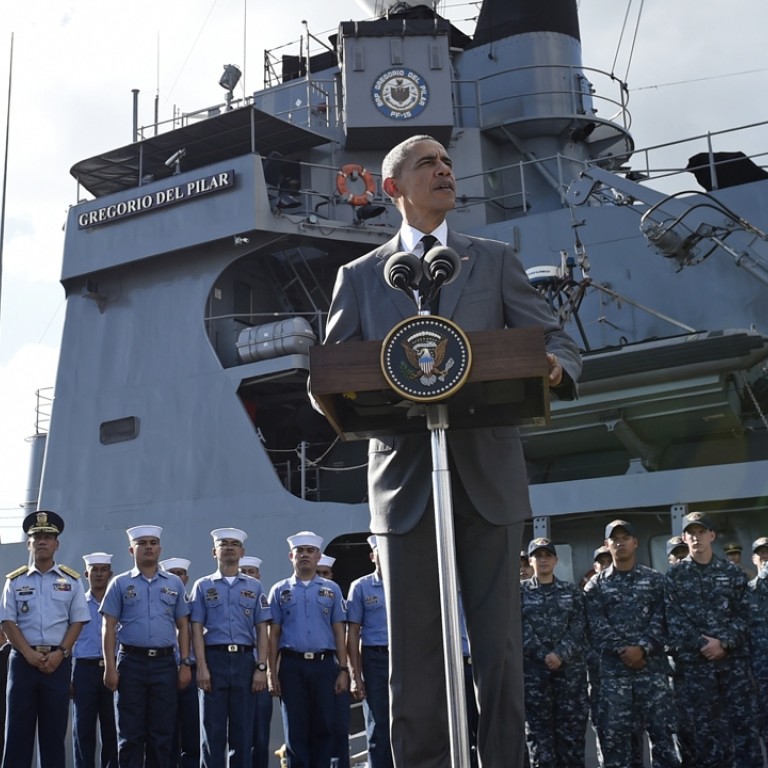
In signal to China, Obama will give 2 ships to Philippines to boost its maritime security
US President Barack Obama put tensions over Beijing’s claims to the South China Sea squarely on the agenda ahead of an Asia-Pacific summit in Manila
With a towering warship behind him, US President Barack Obama on Tuesday announced that his nation will hand over two ships to the Philippine Navy to boost its maritime security capabilities, in a bid to show the US and its allies won’t be cowed by Beijing in disputed waters in the South China Sea.
Obama said the pair of ships — one U.S. Coast Guard cutter, one research vessel — were part of a broader American plan to scale up assistance to naval forces in Southeast Asia, where coastal nations feel threatened by China’s moves to assert control over the South China Sea. Obama said the US had an “ironclad commitment” to the Philippines — a US treaty ally — and a mutual commitment to free and safe navigation at sea.
“More capable navies, in partnership with the United States, are critical to the security of this region,” Obama said as he opened a six-day tour of the Philippines and Malaysia. He said the ships would help the Philippines navigate and patrol its territorial waters.
Obama made the pledges shortly after arriving in Manila for a summit of Asia-Pacific leaders to also be attended by President Xi Jinping.
You can count on the United States

Obama never mentioned China by name as he stood in front of the BRP Gregorio del Pilar, a onetime US-owned frigate, but the intended recipient of his message was clear. As regional tensions with China have simmered in recent years, the US has sought out symbolic ways to counter Beijing’s claims in the region without putting itself in direct confrontation with the powerhouse nation.
Earlier this month, US Defence Secretary Ash Carter boarded a US aircraft carrier plodding through the South China Sea, a week after a US Navy destroyer patrolled close to where China is building an artificial island.
The US has refused to comply with China’s self-proclaimed air defence zone over the South China Sea.
Obama’s announcement came at the start of his ninth trip to Asia, and this one, like the others, was designed to illustrate his efforts to strengthen alliances as part of his seven-year campaign to increase U.S. influence in Asia.

“You can count on the United States,” Obama said.
China had also repeatedly called for the Apec summit, which starts today, to focus exclusively on trade and not be distracted by the rows.
In Beijing just before the US announcement, China’s vice foreign minister Liu Zhenmin warned the other claimants that China could take control of the islands they occupy.
“The Chinese government has the right and the ability to recover the islands and reefs illegally occupied by neighbouring countries,” Liu said.
READ MORE: Philippines and Vietnam boost 'strategic' ties as China sea feuds fester
But we didn’t do that, we exercised maximum restraint.”

During back-to-back summits in Manila and Kuala Lumpur, Obama planned a particular focus on touting the Trans-Pacific Partnership that the U.S. recently struck with 11 other nations — China not included. The sweeping free trade agreement is at the heart of Obama’s Asia policy, but its prospects for ratification by U.S. lawmakers remain uncertain.
Flanked by US and Philippine troops, Obama said he would seek to provide another $140 million in maritime security aid to Southeast Asia next year, although it was unclear whether the US Congress would approve those funds.
On his last trip here, in 2014, Obama signed a defence cooperation pact allowing the U.S. to base troops temporarily at some military camps, but a legal challenge has delayed implementation. Although the country’s pallid military has struggled to push back effectively against China, the Philippine constitution bars permanent US bases.
Additional reporting by Agence France-Presse

